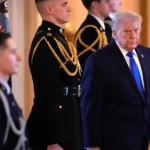

While gas stoves are heating up all the headlines, the Biden administration faces another regulation controversy that could affect the people’s everyday lives, this time at the airport.
In December, the Transportation Security Administration began rolling out technology that allows airline passengers to have their faces scanned at the checkpoint rather than handing over a driver’s license or boarding pass for visual inspection.
FLYING HOME FOR THE HOLIDAYS? TSA IS USING YOUR FACE AS YOUR ID AT THESE AIRPORTS
The rollout of this technology moves the TSA closer to automating identity verification, similar to how Department of Homeland Security agency U.S. Customs and Border Protection scans the faces of incoming and outgoing international passengers.
“Biometric technology has the potential to enhance security effectiveness, improve operational efficiency, and yield a more streamlined passenger experience at the TSA checkpoint,” TSA spokesman Daniel D. Velez wrote in an email when the program began. “TSA recognizes that biometric solutions must be highly usable for all passengers and operators, considering the diversity of the traveling public.”
While it has mostly flown under the radar, the facial scanners have generated a measure of controversy from both ends of the political spectrum over privacy and civil rights concerns.
“Countries like China and Russia use facial recognition technology to track their citizens,” Rep. Jim Jordan (R-OH) tweeted on Jan. 6. “Do you trust Joe Biden’s TSA to use it as well?”
Rep. Troy Nehls (R-TX) offered a one-word reply: “Nope.”
Concerns about the technology stem from worries the images would be used to track activity and eventually become part of a wider surveillance state.
The TSA stresses that automated facial recognition could be more accurate than human scanners and that it could reduce wait times at airport security. Passengers could one day board a plane without having to present a boarding pass, passport, or driver’s license.
The rollout could go nationwide later this year.
“Identity verification is one of TSA’s critical layers of aviation security,” a TSA spokesperson wrote in response to questions from the Washington Examiner. “ To improve identity verification, TSA, with significant support from Congress, has deployed Credential Authentication Technology (CAT), which verifies identity, detects fraudulent IDs, prevents high risk individuals from circumventing security by ensuring the passenger vetted by TSA is the same individual advancing through the checkpoint, and confirms the accuracy of a passenger’s prescreening and flight status. This technology provides critical, mission-essential security benefits.”
While the TSA says the facial scanners are entirely voluntary and that it deletes photos once a match is confirmed, privacy advocates worry that both of those factors will change over time.
“I don’t trust the TSA to evaluate the efficacy of its own facial recognition systems,” Albert Fox Cahn, the founder of the Surveillance Technology Oversight Project, or STOP, told the Washington Post last month.
Conservatives are making most of the noise at the moment to question the TSA’s motives, but concerns about facial recognition cross the political spectrum.
One fear is that the technology doesn’t work as well at identifying women and people of color, which a reporter brought up during a White House press briefing on Jan. 11.
“Critics have raised concerns about the racial inaccuracies, especially for Asians and African Americans, when it comes to this technology,” a reporter asked. “What is the White House’s response to those racial disparities?”
White House press secretary Karine Jean-Pierre responded that the TSA is working to make sure the technology doesn’t suffer from “demographic differential” related to race and gender.
Facial recognition at the TSA predates the Biden administration. It was first tested on international flights in 2017 under President Donald Trump, leading critics at the time to decry the move as motivated by immigration enforcement. San Francisco banned facial recognition software in 2019.
When Biden took office, a coalition of more than 40 civil rights groups sent him a letter opposing facial recognition. The groups said the technology could facilitate the mass tracking of people’s movements in public spaces.
CLICK HERE TO READ MORE FROM THE WASHINGTON EXAMINER
Those fears persist today, even as the government works to expand its use.
“Facial recognition is a unique threat to our privacy because our faces are easy to capture and hard to change,” said Karen Gullo of the Electronic Frontier Foundation. “When the government gathers sensitive biometric information, data thieves might steal it, and government employees might misuse it.”






